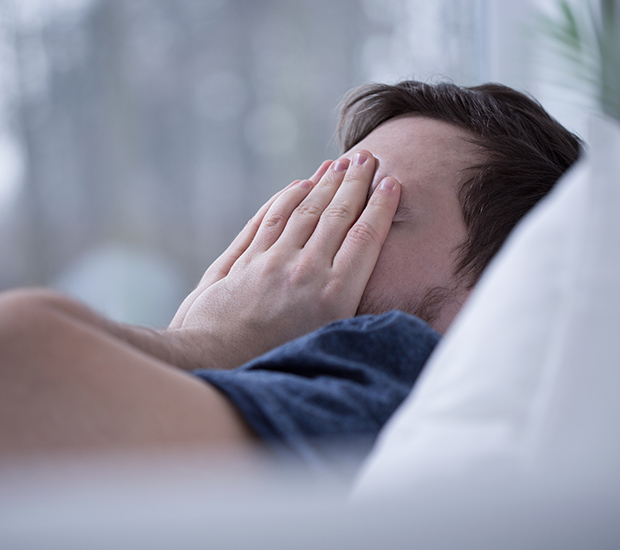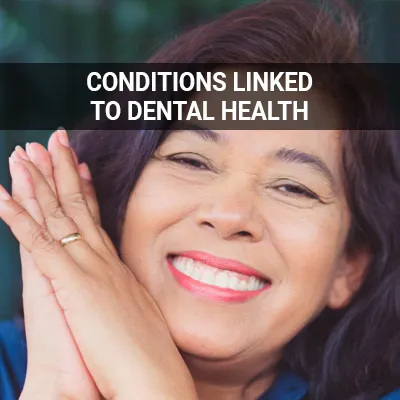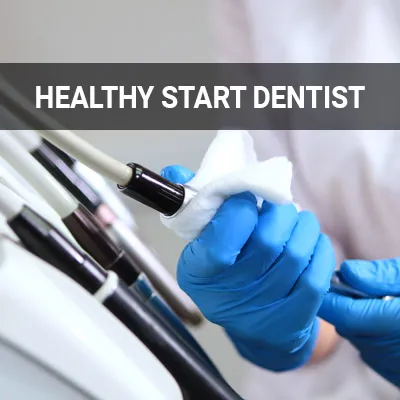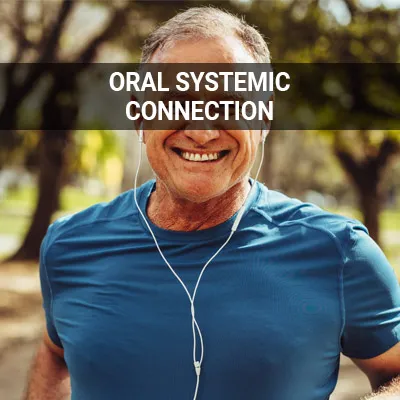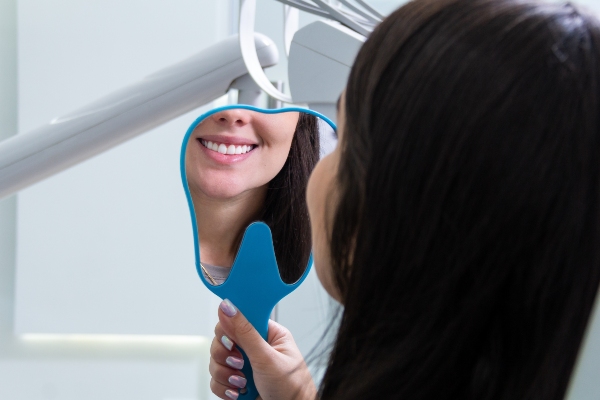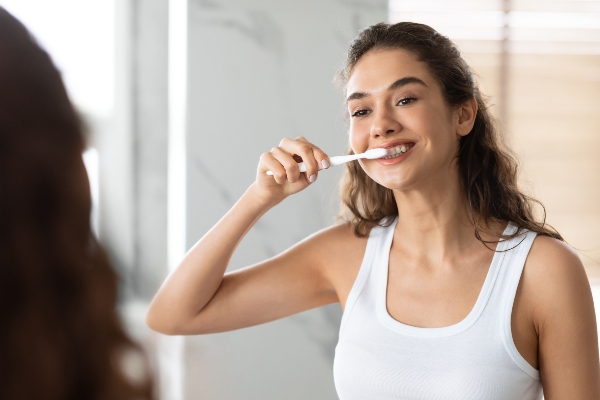How a Complete Health Dentist Treats Sleep Apnea San Ramon, CA
A complete health dentist can investigate the root causes of airway problems and address any oral issues at play. By managing sleep apnea in such a comprehensive manner, a complete health dentist can help you prevent systemic complications. If you suspect you need treatment for sleep apnea, consider seeing a complete health dentist.
Some dentists are myopically focused on teeth and their surrounding structures. However, complete health dentists are concerned with the mouth and its relationship to the entire body, making complete health dentists qualified to practice sleep dentistry. For more information about treating sleep apnea, our team at Aaria Dental in San Ramon is here to help. Call us at (925) 967-2444 to learn more.
Airway Dentistry
The field of airway dentistry is emerging as an important component of complete oral health care. A dentist trained in airway dentistry evaluates the structures of the mouth—examining specific parts like the teeth, gums, tongue, and tonsils—and their relationship to each other. How these parts work together within each individual's mouth can significantly impact how a person breathes, particularly when sleeping at night and the mouth's structures are relaxed.
Signs of Issues with an Airway
When the structures of the mouth impair the ability to breathe, a patient could have an airway issue. Some signs of airway issues include irregularities when one bites down, wear on the teeth in specific places, abnormal jaw alignment, and improper positioning of the tongue to the palate. A patient may have an airway issue if they experience symptoms, such as:
- Daytime sleepiness
- Frequent awakening during sleep
- Awakening with gasping or choking
- Snoring
- Dry throat
“Some signs of airway issues include irregularities when one bites down, wear on the teeth in specific places, abnormal jaw alignment, and improper positioning of the tongue to the palate.”
Understanding Sleep Apnea
There are several kinds of sleep apnea, but obstructive sleep apnea is the most common. In this condition, something blocks (or obstructs) part or all of the patient's upper airway while they sleep. This forces the diaphragm and chest muscles to overcompensate to pull air into the lungs. As a result, the patient's breathing may become very shallow or even briefly stop altogether. When the patient eventually begins to breathe again, they may experience a loud gasp, snort, or body jerk.
Since this condition is only observable to an outsider, many patients may mistakenly believe that they are only suffering from poor sleep. However, sleep apnea symptoms often take a toll on the mouth and jaw, making it possible for total health dentists to recognize the condition. Common signs of sleep apnea include worn tooth surfaces, receding gums, increased cavities, a small jaw, scalloped edges on the tongue, or redness in the throat. Dentists may recommend patients with these telltale signs to partake in a sleep study, as only medical doctors can make an official sleep apnea diagnosis.
“…symptoms of sleep apnea often take a toll on the mouth and jaw, making it possible for total health dentists to recognize the condition.”
Treating Sleep Apnea
There are several treatment options available for sleep apnea, including oral appliances. To use oral appliances, patients must first have impressions taken of their teeth and return for a fitting at a later appointment. Depending on their situation, some patients may need to undergo another sleep test while wearing the device to ensure that it is in working order. Since these devices do not require any electricity, they are relatively unobtrusive and travel-friendly. However, they may require further office visits for any necessary adjustments.
Patients who require more advanced treatment may want to consider continuous positive air pressure (CPAP) machines or surgery. As these treatments are more involved, they may require a referral to a sleep specialist. No matter how serious the case, Aaria Dental can help patients determine the right treatment for them.
“There are several treatment options available for sleep apnea, including oral appliances.”
Check out what others are saying about our dental services on Yelp: How a Complete Health Dentist Treats Sleep Apnea in San Ramon, CA
How Sleep Issues Impact the Rest of the Body
When someone cannot get quality sleep, it can have profound effects on their general health. For this reason, sleep dentistry is a crucial field that has a wide-ranging impact on the rest of the body. People who suffer from sleep apnea can experience many downstream health effects, such as coronary artery disease, high blood pressure, diabetes, stroke, heart attack, visual difficulties, and psychiatric disorders. In fact, the American Sleep Association (ASA) reports that people with sleep apnea have a 30 percent higher chance of having a heart attack or dying of a heart-related disease compared to those without sleep apnea.
“People who suffer from sleep apnea can experience many downstream health effects, such as coronary artery disease, high blood pressure, diabetes, stroke, heart attack, visual difficulties, and psychiatric disorders.”
Questions Answered on This Page
Q. What are the signs of sleep apnea?
Q. How can I treat sleep apnea?
Q. What are common signs of an airway issue?
Q. What are the overall health consequences of sleep apnea?
People Also Ask
Q. What is the difference between sleep apnea and other sleep disorders?
Q. What are some conditions that a complete health dentist can diagnose?
Ideal Candidates for Airway Dentistry
Virtually anybody can benefit from airway dentistry. If left untreated, airway-involved sleep disorders can have disastrous effects on a person's oral health, feelings of restfulness, and overall well-being. An airway dentist can help look for signs of such disorders and, in mild to moderate cases of sleep apnea, help treat them with recommendations for lifestyle changes, oral devices, and referrals to specialists when necessary.
Sleep apnea can affect patients of any age, including children. Furthermore, of all pediatric physicians, dentists are most likely to identify the abnormal tonsil growth that often causes obstructive sleep apnea. Accordingly, regular dental checkups can help catch and treat children's sleep apnea before it has the chance to become problematic. As obstructive sleep apnea often comes with significant developmental concerns, early detection is critical.
Frequently Asked Questions
Q. How common is sleep apnea?
A. According to the American Sleep Apnea Association, sleep apnea affects over 20 million Americans. They also approximate that as much as 80% of moderate to severe cases of obtrusive sleep apnea are undiagnosed.
Q. Can sleep apnea be cured?
A. Unfortunately, as of yet, there is no known cure for sleep apnea. However, Aaria Dental can help you minimize and manage its symptoms so that you can live a more comfortable life.
Q. Is snoring always a sign of sleep apnea?
A. No. Snoring is very common and can occur in anyone. However, if your snoring is severe enough to wake you from your sleep, it may be a sign of sleep apnea. Snoring associated with sleep apnea is generally louder, deeper, and more consistent than "normal" snoring. Those with sleep apnea may also experience choking, gasps, or pauses in between snores.
Q. Are there any risk factors associated with sleep apnea?
A. Approximately half of those affected by sleep apnea are overweight. Sleep apnea is more common in men than in women and in older persons than in younger persons. However, children with enlarged tonsils are also at risk.
Q. Is sleep apnea hereditary?
A. At least one study has found that snoring runs in families. Though snoring is not a cause of sleep apnea, it is one of its key symptoms. Additionally, individuals may inherit narrow airways or be genetically predisposed to have excess tissues in the airway. As such, there is a hereditary component to sleep apnea.
Dental Terminology
Call Us Today
For many patients, airway dentistry is just what they need to put their sleep apnea issues to rest. We at Aaria Dental may be able to help. Call us today at 925-967-2444 to schedule an appointment or to learn more about our services.
Helpful Related Links
- American Dental Association (ADA). Glossary of Dental Clinical Terms. 2025
About our business and website security
- Aaria Dental was established in 2023.
- We accept the following payment methods: American Express, Cash, Check, Discover, MasterCard, and Visa
- We serve patients from the following counties: Contra Costa County
- We serve patients from the following cities: San Ramon, Norris Canyon, Danville, Blackhawk, and Dublin
- Norton Safe Web. View Details
- Trend Micro Site Safety Center. View Details
Back to top of How a Complete Health Dentist Treats Sleep Apnea
QR code for How a Complete Health Dentist Treats Sleep Apnea
